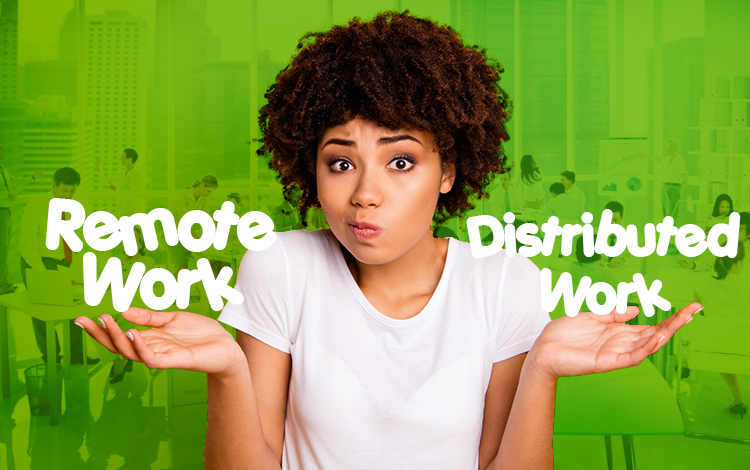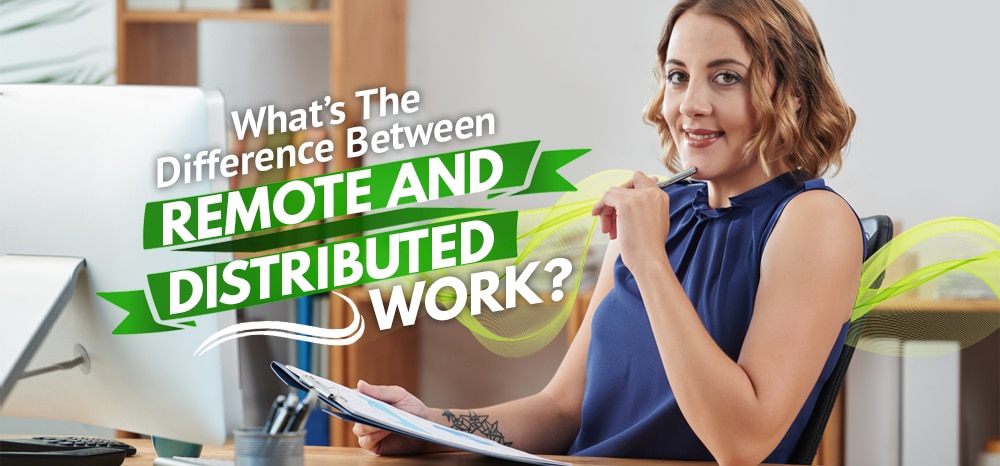Remote work is quickly becoming mainstream, not least because many employees are loath to go back to the traditional workplace.
They’re not the only ones, clearly. Remote work has helped many companies stay afloat since it helped them cut overhead costs while maintaining or even boosting productivity.
While work as we know it has been constantly heading towards a WFH set-up, the pandemic did speed things up. In some ways, WFH was the phrase that defined 2020.
Unfortunately, we’ve been using the terms “remote work” and “distributed work” so often and so interchangeably that we tend to think of them as the same.
Sure, they’re related and are very similar, but there are key differences. Read on and find out.
Remote Work and Distributed Work Distinguished

Even before the COVID-19 virus turned the world upside down, there were already remote workers. Many of them were freelancers, and some were gainfully employed, yet didn’t report to the office. Simply put, remote work applies to the individual worker.
On the other hand, distributed work applies to the entire company or at least, to a group of people. What do we mean by this?
At the onset of 2020, organisations took their businesses online and adopted a digitised approach. The ban on in-person interaction and collaboration simply made it necessary. Therefore, when we talk about distributed work, it refers to a company’s organisational approach. Remote work, on the other hand, pertains to how each individual carries out the work distributed to them.
Remote Work and Its Implications For the Workplace

Now that we know the main difference between the two, let’s take a closer look at how remote work can affect your decisions in a post-pandemic world.
If you own and/or manage a business, there’s a big chance that you also have a physical office. (Or had.)
Now, if you plan to run things 100% remotely, then that’s pretty straightforward. You can then terminate your lease on the office space and have everyone continue working as they are. (Provided that you’ve already set up your team with the right gadgets and software, of course.)
However, bear in mind that remote work still requires a center of operations. I’m not talking about a physical center, but a clear chain of command. Sure, remote work is also about giving your employees more trust and autonomy. But they should know who or where to turn to in case they need to escalate an issue or concern.
Distributed Work and Its Implications for the Workplace

Companies today thrive on decentralised organisations with leaders and workers in different locations. And with good reason.
For one, once you open up your organisation towards distributed work, your access to different talents around the world is practically limitless. You’re no longer restricted to your city, region, or country.
Secondly, you can scale on a relatively shoestring budget since there are far less overhead expenses involved.
Lastly, future lockdowns won’t be as much of a concern. Distributed teams can function well with the right leadership regardless of their physical locations.
So if you’re planning to adopt a fully-remote workforce, you may want to transition to a distributed organisation down the line.
At the end of the day, both remote and distributed work can help you achieve your business goals. It all boils down to your preferences: a hybrid model or a fully-remote organisation. Whatever you choose, you will need skilled and talented remote workers to bring your dreams to fruition.
Fortunately, Remote Staff has been assisting AU SMEs and entrepreneurs like you in finding and hiring skilled remote workers from the Philippines since 2007. So whether you need an entire remote team or are just looking for a virtual assistant to keep track of everything, we got you covered.
Call us today or schedule a call back and let’s get started.
Serena has been working remotely and writing content for the better part of the last decade. To date, she's written for Pepper.ph and Mabuhay Magazine, among others, and has churned out more than a thousand articles on everything from The Basics of Stock Market Investing to How to Make Milk Tea-Flavored Taho at home. Hermits, aspiring hermits, and non-hermits with interesting project propositions may email her at serena.estrella10@gmail.com.
























 Zero Recruitment Fee
Zero Recruitment Fee